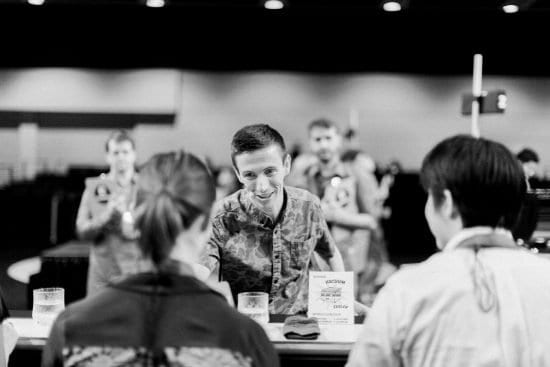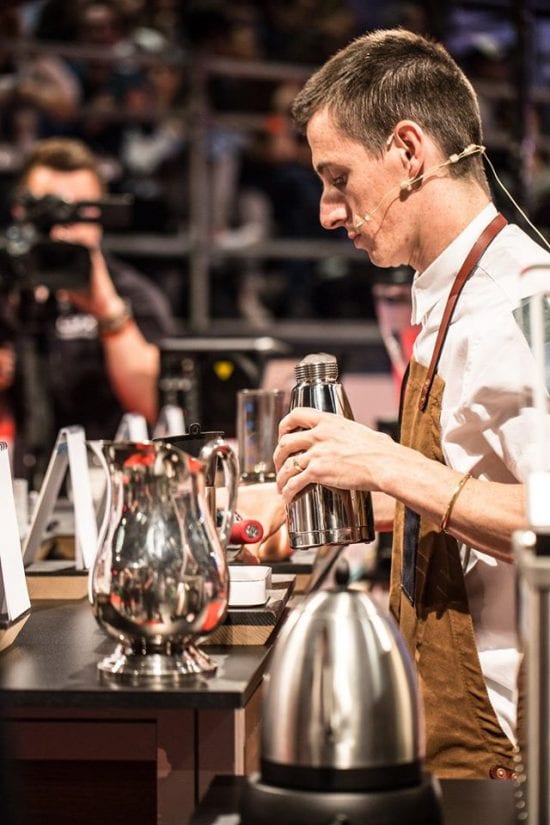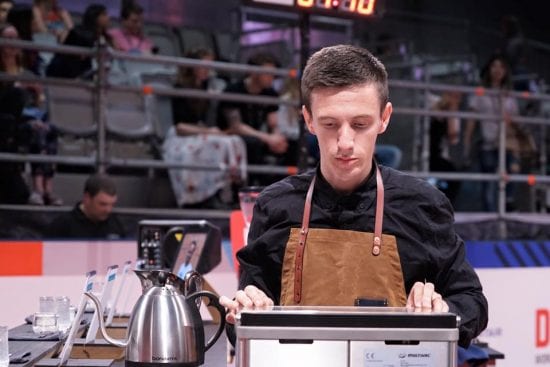
In this series, we’ll share the secrets of barista competitors. From choosing a theme to setting a practice schedule, competitors discuss how to compete smartly, efficiently, and effectively.
BY ASHLEY RODRIGUEZ
BARISTA MAGAZINE ONLINE
Most coffee competitors are repeat participants. Competitors typically view their first competition as a “learning experience,” and we hope to do better the next time we compete. But we can’t expect to do better if we don’t learn from our mistakes. “I have competed for seven years now (yeah, I’m old),” shares Monogram Coffee‘s Ben Put, the three-time barista champion of Canada. “I have tried many different approaches and techniques in competition, with varying levels of success.”
Ben is the second-winningest barista from Canada (Sammy Piccolo won the competition four times), but he wasn’t always equipped with the tools to do well. “Looking back, there are things that I have always done that have worked well for me and there are things that I wish I had done earlier. I encourage baristas to learn as much (if not more!) from their own and others’ mistakes as they learn from their successes.” Today, Ben shares some tips he has learned from his years of competing, as well as advice on how to continue to improve and be a better competitor year after year.
- Take the feedback of the judges seriously.
We know that every competitor works hard to present their coffee to the judges, but only a few competitors can earn the top spots. “Competitors devote time and money to competition, and with the right mindset the competitions can be richly rewarding,” Ben notes. “That said, receiving low scores or not placing as high as you expected is not the most fun way to end a weekend of hard work. But it is one of the best times to learn because this is when you go into judges’ debriefing.” It can be difficult after not doing as well as you’d like or placing just out of the qualifying range to read and trust comments from the judges, and Ben admits he often overlooked these notes. “For many years, I skipped judges’ feedback. It wasn’t out of malice; I was just too emotionally drained to properly receive constructive criticism. This was a huge mistake. I spent months practicing and trying to learn more about coffee, and then I would routinely turn down one of the biggest learning opportunities of the entire process.”

Ben says this detailed feedback from industry experts is invaluable. “The notes that the judges take during your presentation serve two purposes: They qualify the overall experience through their notes, which feeds into the (quantified) numerical scoring, and they provide a record of your performance for you to go over with the judges in the debriefing and feedback time.” So take the time to not only read your notes, but find your judges and talk to them. “Be humble, polite, and ask lots of questions,” Ben advises. “Judges give feedback to every competitor, but if you are receptive and engaged, it will make their job easier and you will learn more. If the only thing you get out of judges’ debrief is a heightened ability to receive criticism, it’s already a big win.”
- Share your presentation with everyone you know.
“Most competitors have a coach or small team of people that help them prepare for competition,” notes Ben. “This is great, but it has one key flaw: The same people are going to watch you run sets over and over again.” Getting a fresh set of eyes on your routine is key to making sure your message lands with the judges, who will be seeing it for the first time. “They [the judges] are furiously taking notes, trying to remember tasting notes and drinking instructions, all while under strict orders to make eye contact when you are talking. If your set is not clear and easy to follow, most of it will be lost on the judges,” Ben reminds competitors. “The best way I found to fix this is to constantly present to fresh faces. When a friend or a regular comes into the shop, ask if you can run your speech with them. They might not understand all of the details, but by the end they should have a handle on your main thesis.”

- Practice both your routine and your prep time.
Most competitors will spend most of their time practicing their actual routine, but the competition is also about how you handle all the other moments throughout. “One of the hardest parts of competition in my opinion is that you only get the full experience a couple times a year, at most,” Ben notes. “This means that even a very seasoned competitor might only have logged a few hours of competition time. This short amount of actual competition time makes it really hard to adjust and settle into the competition and present at your full potential. There are so many other tasks and stressful moments that lead up to the actual competition time.”

So make sure your practice sessions are designed to prepare you for the entire competition experience. “The way to avoid this is to re-create and run through each part of the competition: Get a prep cart and set it up within a short time limit; prep your ingredients beforehand with the same amount of limited equipment you will have at competition; do the full 15-minute preparation and setup including dialing; when you run sets, compete to your music and try to visualize the competition space before you compete,” Ben suggests.
- Talk to other competitors.
You’re probably reading this series because you want to know more about competition and you trust the advice and knowledge of others. If so, then you probably realize the importance of talking to your peers and asking for tips. “When I get stressed at competitions, I turn to my friends and my teammates because I know that I can confide in them. This means that I spend less time on the floor with other competitors and their teams. When this occurs at competitions, it may unintentionally create cliques within the competition format,” Ben shares. “I’ve done this often and I know that I could have had better experiences and formed more relationships if I had stepped out of my stress and spent time with my peers.”

It’s natural to gravitate toward your team during competition, but you learn not just through practice, but through watching others and listening to your peers. “Watch other competitors and cheer them on; you’ll learn from them and it strengthens the community,” Ben advises. “Go to the barista parties; you’ll get to see competitors outside of the stress of the competition. Help your other competitors if they need it—you’re all in the same boat, and a little bit of support from a fellow competitor means a lot.” Competing can be a scary and isolating experience, and your support and encouragement will likely mean a great deal to your peers.

